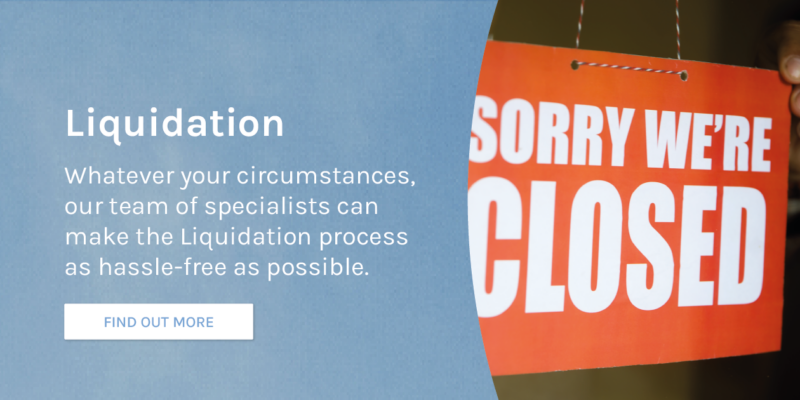If your company has been forced to close, you might be asking yourself ‘can I start a new company after liquidation’, can you try to pick up where you left off and create a brand new business particularly if you feel that the liquidation was due to something out of your control.
If this is your goal, it’s important that you first get to grips with exactly where you stand, what your position is, can you start a new company after liquidation in the first place, what restrictions are in place, etc.
Find out about all of these subjects and more in our blog.
Can You Start a New Company After Liquidation?
Broadly speaking, yes you can start a new company after liquidation. You are allowed to have as many businesses running at one time as you like. However, if you wish to start a new company with the same or a similar name as the old business, legal issues will crop up.
The reason directors are prohibited from forming a new business with a shared or similar name to a recently liquidated one (otherwise known as passing off) is that this could cause significant confusion for any creditors the old business may have had. Creditors may also feel that a new business trading in the same field under the same or a similar name as a previous company is a disingenuous thing to do.
However, it may be possible to purchase the original company name through the liquidation process. If HMRC were a significant creditor of your liquidated company — and this is not the first time that such a situation has occurred — HM Revenue & Customs may insist on a VAT or PAYE deposit being enforced on the new business. The reason for this is to better protect their position from history potentially repeating itself.
If you are a director seeking to start a new company following liquidation, it is important that you read Section 216 of The Insolvency Act to find out more about your position.
What is Section 216 of the Insolvency Act 1986?
Section 216 of the Insolvency Act 1986 is a vital document for any director of a now insolvent company that wishes to push on and start afresh in the near future. It outlines the exact restrictions that are in place for any director of an insolvent company.
Section 216 was initially created to prevent directors from liquidating their insolvent company and starting again with a business bearing the same or a near-identical name to effectively replace the original business. While Phoenixing a business is legally allowed, it is not permitted to just avoid repaying creditors and continue as if nothing happened.
What are the Restrictions When Setting Up a New Company After Liquidation?
As stated in Section 216 of the Insolvency act, restrictions in place when setting up a new company following liquidation revolve around limiting director’s involvement with a new company sharing a name with a recently liquidated business, the purchasing of business assets from liquidator, applying to courts to reuse the name, etc.
The restrictions when setting up a new company after liquidation include:
Setting up a New Business With the Same Name
The main restrictions in place when setting up a new business following liquidation is that any director involved in a company in the 12 months prior to insolvency is unable to do any of the following for a company that shares, or has a similar name, to their former, now liquidated, business:
- Become director
- Be involved with the formation
- Promote
- Have a hand in the management
You are unable to reuse your company’s name. However, there are a few notable exceptions.
Purchase The Business From Liquidator
If you wish, you may be able to purchase your former company. If so, it may be possible for you to then adopt this name, or a similar name. While the actual purchasing will be from the liquidator, you are obligated to inform any creditors of your intentions to trade under the same (or a similar) name. You must also publicly advertise this fact in The London Gazette.
Apply To Use The Name
You may be able to apply directly to the courts for permission to reuse the same company name. Referred to as ‘applying for court leave’, this process must be started and the request must be lodged with the court within seven days of business liquidation.
Already Used The Name
If the business was already known by the contested name 12 months before liquidation. For the company to be able to use the name, it can’t have been dormant at any point during the 12 months prior to insolvency.
HMRC Restrictions
If you start a new business following the liquidation of one or more ventures in the past, HMRC may enforce some restrictions on you upon start up. This can vary and includes:
- Providing a security deposit to HMRC (if the old company owed tax debts when it was liquidated) to cover their perceived risk of becoming a creditor again down the line.
- Being required to provide additional assurances going forward that you will be able to meet your tax commitments. This is most commonly done via a security bond where you essentially are required to put a down payment on upcoming tax obligations.
How Inquesta’s Team Can Assist You
Are you the director of a now dissolved business? If so, you’re likely to be considering the best next steps for you. If so, it is highly recommended that you speak to a licensed insolvency practitioner as soon as possible. As mentioned in this blog, there are a number of restrictions in place regarding starting a new business after liquidation — so it’s vital that you know exactly what your next steps will be, and what potential stumbling blocks to avoid.
Inquesta’s team of insolvency experts have dedicated years to mastering all the skills needed to provide high-quality insolvency advice that can help support and guide you and your company for years to come. We appreciate the stress that liquidating your business can bring, so we aim to approach any such situation as delicately as possible, with the best interests of our clients at the forefront of everything we do.
So no matter who you are, the level of your business, or what its position is, we can help. Our insolvency experts can support you with all manner of subjects, from administration and liquidation, to business recovery and bounce back loans, and much more.





